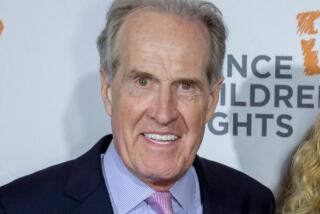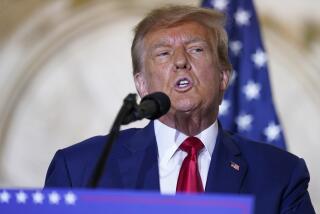Clark, Hussein Defender, May Put U.S. on Trial
BAGHDAD â High-profile American lawyer Ramsey Clark came to the aid of Saddam Hussein on Monday, formally joining his team of attorneys. But although the former U.S. attorney general may have found the ultimate platform for his vehement opposition to the Iraq war, legal experts were divided over whether his participation would hurt or help the deposed dictatorâs case.
Clark, 77, has long been a champion of controversial causes and has had a roster of notorious clients, including a leader of the Rwandan genocide, former Yugoslav President Slobodan Milosevic and the Palestine Liberation Organization. Clark, who met with Hussein briefly before the U.S.-led invasion in 2003, had for months advised the ousted strongmanâs team in his defense against murder charges.
Based on the Dallas nativeâs performances in previous high-profile trials, legal observers say he is almost certain to bypass the specific allegations against Hussein and instead will try to turn the proceedings into a forum for airing his grievances against U.S. foreign policy.
In a Jan. 24 opinion article he wrote for the Los Angeles Times, Clark said he was willing to take up Husseinâs cause because the court trying him âwas illegitimate in its conception -- the creation of an illegal occupying power that demonized Saddam Hussein and destroyed the government it now intends to condemn by law.â
But in Baghdad on Monday, Clark limited his criticism of the trial to more concrete matters. In a written statement, he urged the Iraqi tribunal trying Hussein and his co-defendants to bolster protection for defense attorneys, two of whom have been shot dead. When a fellow attorney tried to read the statement, a judge cut him off.
Officials with Iraqâs government, made up mostly of Husseinâs longtime enemies, reacted angrily to Clarkâs presence. They said the tall Texan would distract attention from what should be the trialâs main focus: Husseinâs alleged crimes against the Iraqi people.
âI guarantee you the Iraqi people will be outside in Baghdad at the courthouse demonstrating against Mr. Clark,â Bassem Ridha, an advisor to Iraqi Prime Minister Ibrahim Jafari, told CNN.
âHeâs here for propaganda,â said Ali Dabagh, an Iraqi legislator who was among the few politicians in the courthouse.
Some legal experts say Clarkâs gambit may jeopardize Husseinâs defense. Michael P. Scharf, a Case Western Reserve University legal scholar who trained lawyers for the trial and produces a blog devoted to the trial, said that for Clark, the question of Husseinâs guilt or innocence is moot.
âHe doesnât believe Saddam Hussein didnât commit crimes,â Scharf said.
âBut heâs so angry that the U.S. started the war without U.N. Security Council authorization that he wants to turn the trial into a bully pulpit in which to indict the Bush administrationâs foreign policy.â
But other trial-watchers said Clark has raised fair questions about the legality of the tribunal. Even in the U.S., they noted, courts are sometimes called upon to show that they have legitimate jurisdiction over certain cases.
âThat is a fundamental principle of fair judicial process,â said Diane M. Amann, a professor of international law at UC Davis. âThat is a fairly routine question and entirely appropriate to bring before a new tribunal. It should be considered seriously.â
Clark, the son of a U.S. Supreme Court justice, served as U.S. attorney general during the final years of the Lyndon B. Johnson administration.
He became increasingly active in leftist politics, opposing the Vietnam War and visiting communist Hanoi in 1972.
Over the years, heâs been a vocal opponent of U.S. foreign policy and military intervention. He attended a 1980 conference in post-revolutionary Tehran focusing on U.S. wrongdoing. He defended the PLO against accusations brought by the family of a disabled Jewish man who was slain by militants aboard a cruise ship in 1986.
Clarkâs opposition to U.S. intervention in Iraq dates back to 1990, when he took part in the defense of American troops who refused to serve in the Persian Gulf War.
In a lengthy 2004 letter to United Nations Secretary-General Kofi Annan, he condemned the 2003 invasion as a gross violation of international law.
âA huge, all-powerful nation has assaulted a small prostrate, defenseless people halfway around the world with âshock and aweâ terror and destruction, occupied it and continues daily assaults,â he wrote.
Some observers object to Clarkâs penchant for dragging such politically charged sentiments into criminal trials.
âHeâs a true believer of ultra-liberal causes,â Scharf said. âWhat bothers me is that he tries to turn court cases into political shows.â
Times staff writer Henry Weinstein in Los Angeles contributed to this report.
More to Read
Get the L.A. Times Politics newsletter
Deeply reported insights into legislation, politics and policy from Sacramento, Washington and beyond. In your inbox three times per week.
You may occasionally receive promotional content from the Los Angeles Times.










